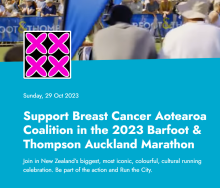
Very few studies have looked at the impact of diet or exercise in patients with advanced breast cancer (ABC). On a biological level, repeated exercise may limit tumour growth, and some dietary interventions, e.g., plant-based diets, can help improve fatigue. But more research is needed in all these areas. Until there is more evidence, there are things that patients can do to improve their quality of life with a diagnosis of advanced breast cancer.

October 13th is Metastatic Awareness Day in the United States, thanks to Shirley Mertz, a metastatic breast cancer survivor from the United States.

Many patients with advanced breast cancer develop lymphoedema either after surgery or as a result of cancer itself. It is swelling on the arm, back or chest on the side of the breast surgery, and can occur at any time after diagnosis, even years later. There are four phases of lymphoedema, ranging from almost completely asymptomatic to debilitating, where it can cause severe pain and reduce a person’s inability to work or perform normal activities.

Many patients with advanced breast cancer use herbs and supplements, as well as other treatments like relaxation and massage, to relieve symptoms. However, many patients are taking herbs or supplements that may be harmful or interact with their cancer medications. Most cancer drugs and most foods, herbs and supplements are broken down by the same liver enzyme pathways; a particular example is grapefruit, which therefore interacts with trastuzumab and paclitaxel (among many others). Two…

BCAC’s Marion Barnett recently attended ABC7 online, an international conference on advanced breast cancer. Here is her report on a talk about integrative medicine given by German breast cancer researcher Rachel Würstlein. Integrative medicine is the combination of medical treatments for cancer and complementary therapies to cope with symptoms and side effects.

Want to get into the Christmas spirit, but tired of giving and receiving stuff that no-one really needs? The Good Registry takes the stress out of gift giving, and gives you an opportunity to help BCAC, by offering gift cards that can be redeemed as donations to a select group of charities, including us. Get your Christmas gift-giving all sorted now by clicking here.

Here’s an easy way to get Christmas gifts organised well in advance and to help BCAC at the same time. By clicking here you can buy gift certificates for those friends and family who already have everything they need, but would get a great feeling knowing they are helping women with breast cancer.

When you’re caught up in the flurry of medical activity after a breast cancer diagnosis, it’s easy to lose sight of ordinary life. Things that were important, like our relationships and our sex lives, get put on the back burner. Turning our focus back onto those things, and even knowing where to start again, can be difficult.

Christmas is coming! But don’t panic – BCAC’s partnership with The Good Registry can make gift-giving easy this year. By clicking here you can buy gift certificates for those friends and family who already have everything they need, but would get a great feeling knowing they are helping women with breast cancer. The Good Registry is a great volunteer organisation set up by some Wellington women who are passionate about doing good.…

BCAC is now one of the charities that runners in the Auckland Marathon can support. If you have entered the marathon, or know someone who has, why not support women with breast cancer by doing a bit of fundraising on the side!



